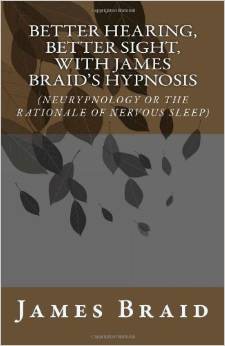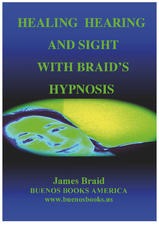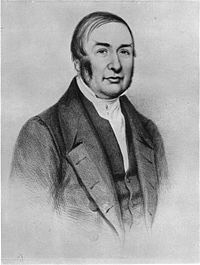Better Hearing, better Sight with Braid's Hypnosis (NEURYPNOLOGY OR THE RATIONALE OF NERVOUS SLEEP)

- Broché: 224 pages - 16.87 € (En vente uniquement sur Amazon)
- Editeur : Buenos Books America LLC (1 avril 2009)
- Langue : Anglais
- ISBN-10: 1932848487
- ISBN-13: 978-1932848489
- Dimensions du produit: 14 x 1,4 x 21,6 cm
In this book, James Braid describes in detail how he proceeded to successfully cure: - serious sight impairments, - deafness (even congenital deaf dumbness), - chronic or acute rheumatism, - paralysis etc... When he hypnotized a patient, he had the power -with simple techniques explained in the book- to direct or concentrate "nervous energy, raising or depressing it in a remarkable degree, at will, locally or generally," to improve capillary circulation, remove muscular tension, bring life force where needed, and balance the whole body of the patient, without needing to work with their imagination or on psychological issues. He believed that the brain was the organ of the mind, and that the mind could be acted on through the body, but was not, however, "a mere attribute of matter."

Edition reliée, couverture rigide toile bleue en vente sur Amazon et chez Buenos Books
- Relié: 388 pages - 35 €
- Editeur : Buenos Books America; Édition : large type edition (1 décembre 2008)
- Langue : Anglais
- ISBN-10: 1932848495
- ISBN-13: 978-1932848496
- Dimensions du produit: 14 x 2,5 x 21,6 cm
James Braid (1795-1860) was a Scottish neurosurgeon and the inventor of a new method of inducing hypnosis. His approach to medical hypnosis was scientific and practical. As a surgeon, he used this technique to heal many patients. In this book, he describes in detail how he proceeded to successfully cure:
- serious sight impairments,
- deafness (even congenital deaf dumbness),
- chronic or acute rheumatism,
- paralysis etc...
When he hypnotized a patient, he had the power -with simple techniques explained in the book- to direct or concentrate “nervous energy, raising or depressing it in a remarkable degree, at will, locally or generally,” to improve capillary circulation, remove muscular tension, bring life force where needed, and balance the whole body of the patient, without needing to work with their imagination or on psychological issues.
He believed that the brain was the organ of the mind, and that the mind could be acted on through the body, but was not, however, “a mere attribute of matter.”
Quotes from the book:
About deafness:
“I consequently tried it in such cases, and where there has not been destruction, or irreparable organic injury to the auditory apparatus, I can confidently say, I know of no means equal to hypnotism, for benefiting such cases. Of course, it cannot suit all cases, but I am satisfied it will succeed in a numerous class of cases, and in some which bid defiance to all other known modes of treatment.”
About sight impairments:
“...before being hypnotized, she could not distinguish the capitals in the advertising columns of a newspaper. After being hypnotized, however, she could, in a few minutes, see to read the large and second heading of the newspaper, and next day, to make herself a blond cap, threading her needle WITHOUT the aid of glasses.”
Braid, J., Neurypnology or the Rationale of Nervous Sleep Considered in Relation with Animal Magnetism Illustrated by Numerous Cases of its Successful Application in the Relief and Cure of Disease, John Churchill, (London), 1843.

